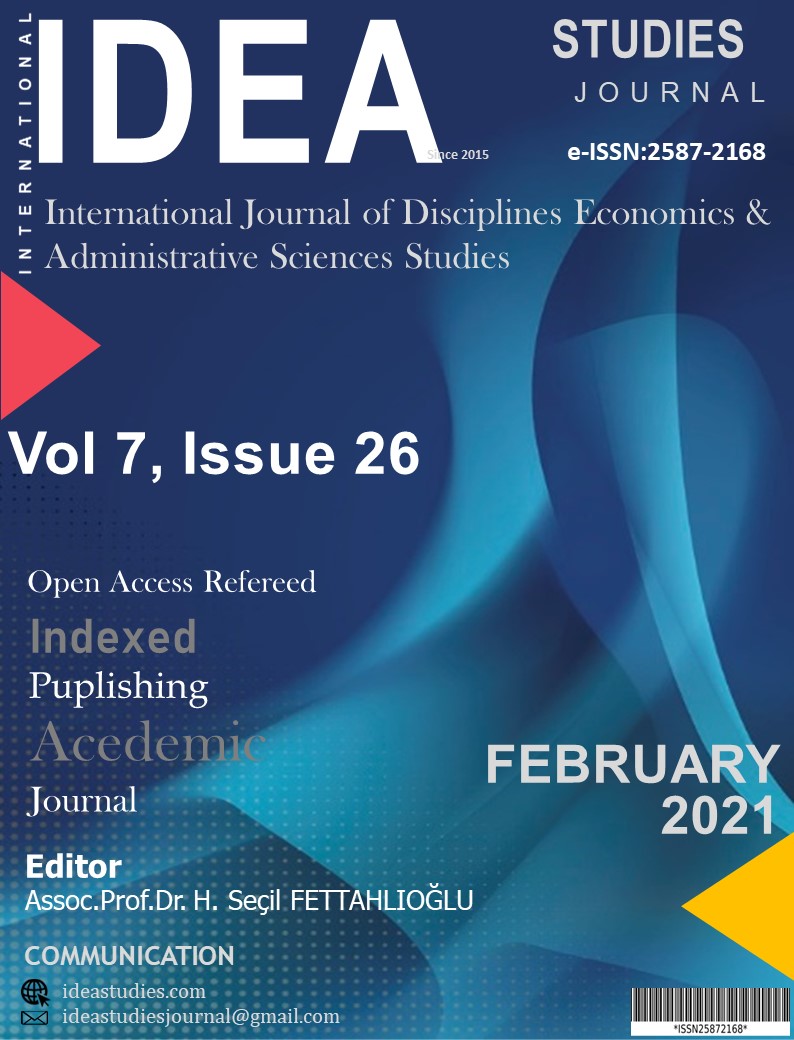Author :
Abstract
Özbekistan’dan göç incelendiğinde, son yıllarda Rusya, Kazakistan, Türkiye, Güney Kore, Birleşik Arap Emirlikleri gibi ülkelere işgücü göçünün akışı dikkat çekmektedir. Bu araştırmada yerli ve yabancı çalışmalara dayanarak, Özbekistan’dan göçün toplumsal cinsiyet boyutu incelenmektedir. Dolayısıyla, toplam işgücü göçü analiz edilerek bunun sosyal-ekonomik etkisi ve toplumsal cinsiyet yönleri araştırılmaktadır. İşgücü göçünün toplumsal cinsiyet boyutu, uluslararası literatürde ele alınmasına rağmen Özbekistan örneğinde çok az sayıda bilimsel araştırma bulunmaktadır. Bu doğrultuda araştırmanın amacına ulaşabilmek için, öncelikle alan yazın taraması yapılmış, ardından istatistiksel analizler kullanılmıştır.
Keywords
Abstract
Reviewing emigration from Uzbekistan, in recent years countries such as Russia, Kazakhstan, Turkey, South Korea, and United Arab Emirates are the top migrant-receiving destinations. In this research, the gender dimension of migration from Uzbekistan is examined based on domestic and foreign studies. Therefore, the total labor migration is analyzed, and gender aspects of migration and its social-economic impact are investigated. Although the gender aspects of labor migration is widely discussed in the international literature, there are very few scientific studies in the Uzbekistan case. In this paper, we review literature and use statistical analysis.
Keywords
- Abdullaev Evgeniy (ed.) (2008). Labour Migration in Uzbekistan: Social, Legal and Gender
- Abdullaev Evgeniy (ed.) (2008). Labour Migration in Uzbekistan: Social, Legal and Gender Aspects, Tashkent.
- Agadjanian V. (2014). Economic Incorporation, Civil Inclusion, and Social Ties: Plans to ReturnHome Among Central Asian Migrant Women in Moscow, Russia, Internaiıonal migration Review Volume 48 Number 3 (Fall 2014):577–603.
- Erica Marat (2009). Labour migration in Central Asia: implications of Global economic Crisis, Johns Hopkins University-SAIS, Washington, D.C.
- Gender Equality in Uzbekistan (2005). Facts and Figures 2000-2004, Uzbekistan.
- Ilkhamov A.(2011). Labour Migration and the Ritual Economy of the Uzbek Extended Family,Centre of Contemporary Central Asia and the Caucasus, School of Oriental and African Studies (SOAS), University of London.
- Ivakhnyuk, Irina (2006). “Migration in the CIS region: common problems and mutual benefits.” Italy, Turin: International Symopsium on International Migration and Development.
- Kakharov, Jahangir (2012). Labor Migration from Uzbekistan. Himalayan and Central Asian Studies, 104-117.
- Kamp, Marianne (2005). “Gender ideals and income realities: Discourse about labour and gender in Uzbekistan,” Nationalities Papers, 33 (3) 403-422.
- Kuehnast, Kathleen and Carol Nechemias (2004). Post-Soviet Women Encountering Transition:Nation Building, Economic Survival, and Civic Activism. Washington, D.C.: Woodrow Wilson Center Press.
- Lazreg, Marnia, (ed.) (2000). “Making the transition work for women in Europe and Central Asia”In series: Europe and Central Asia Gender and Development Series, Discussion Paper No. 411. Washington D.C.: The World Bank.
- Maksakova, Lyudmila (2006) “Uzbekistan: Feminization of Labour Migration in Uzbekistan.” InMigration Perspectives: Eastern Europe and Central Asia, Roger Rodriguez Rios, (ed.), pp. 133- 147. International Organization for Migration.
- Migration and Remittances Factbook (2011). www.worldbank.org/migration.
- State Committee of Statistics of the Republic of Uzbekistan, (2002). Women and Men of Uzbekistan in 2002, Tashkent.
- State Committee of the Republic of Uzbekistan on Statistics (2010). Women and Men of Uzbekistan for 2004–2007, Tashkent.
- Uzbekistan, Gov. (2007). Welfare Improvement Strategy of Uzbekistan: Full Strategy Paper for2008–2010. Tashkent: Adopted at the Meeting of the Presidium of the Cabinet of Ministers of the Republic of Uzbekistan.
- Radnitz S. (2006). Weighing the Political and Economic Motivations for Migration in Post-Soviet Space: The Case of Uzbekistan, , Europe- Asia Studies.





